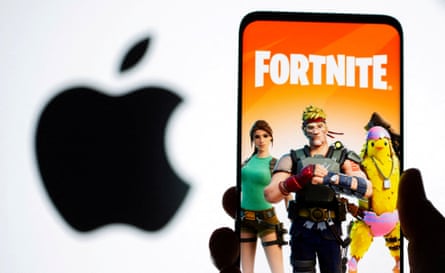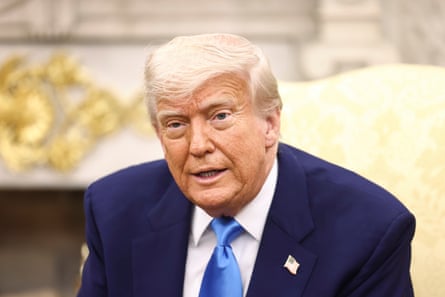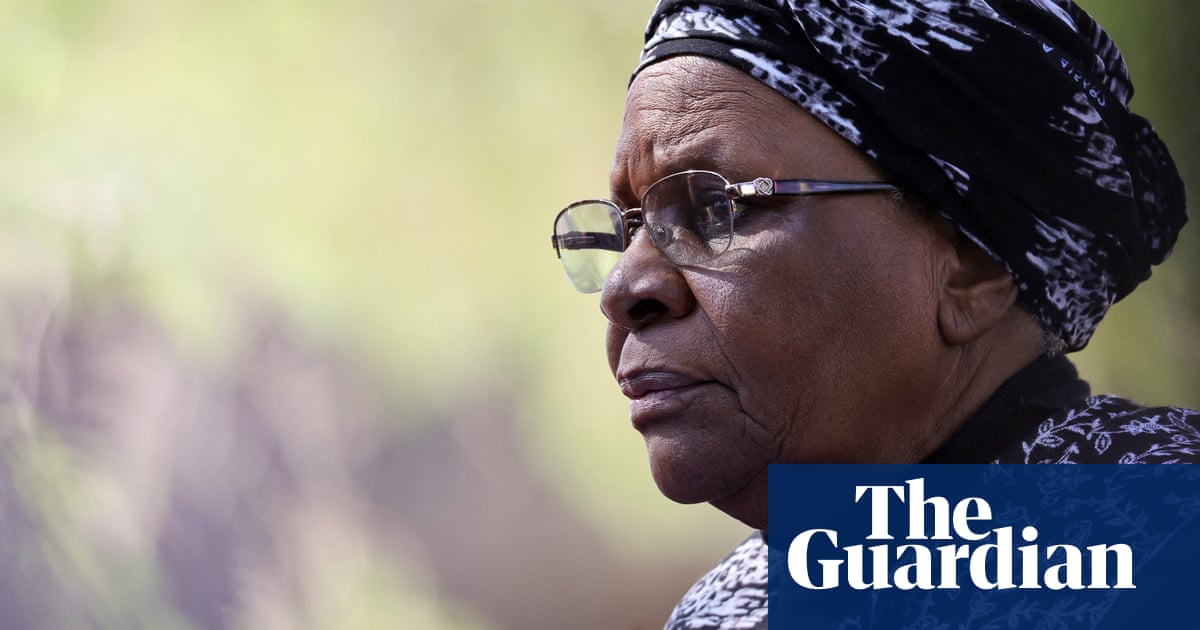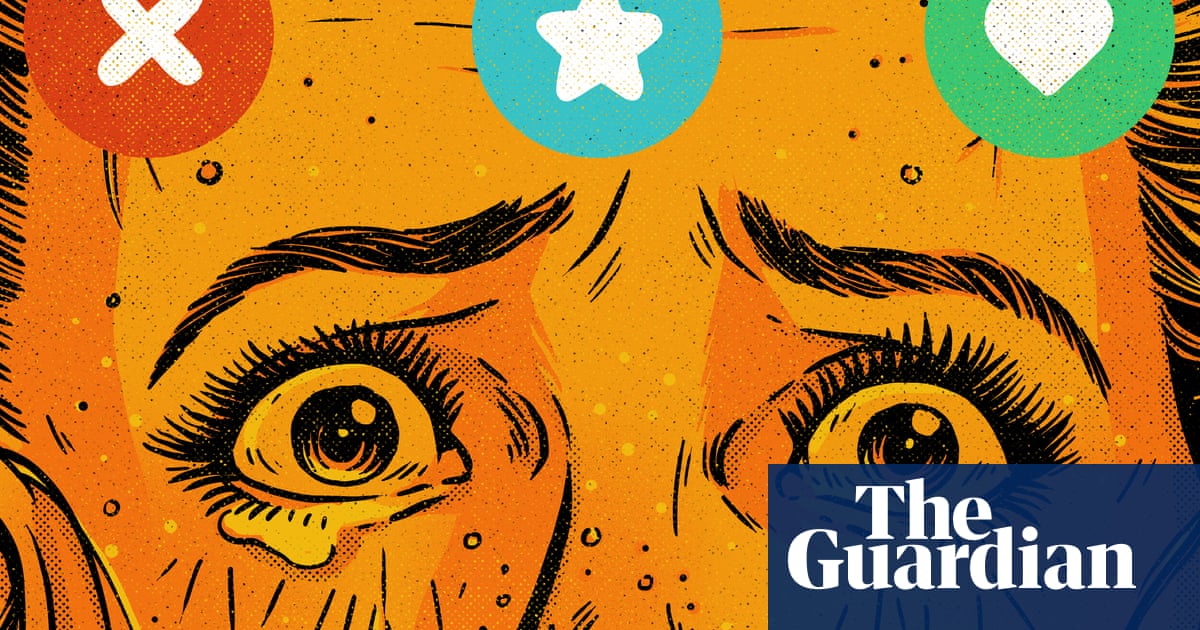Hello, and welcome to TechScape. This week in tech: Apple struggles on multiple fronts, OpenAI grows increasingly ambitious, and Trump helps some of his fans lose money on cryptocurrency.
Apple finds itself in three binds – tariffs, AI, and Fortnite
Long dominant and unassailable, Apple is showing signs of weakness. The CEO, Tim Cook, can’t tame Donald Trump’s threats of tariffs that would spike the price of an iPhone; Apple’s AI offerings pale against its competitors; and the company can’t win a Fortnite match – or a single battle in its legal war with Epic Games – to save its life.
On Friday, the president threatened to levy a 25% tariff on any iPhone not made in the US. Trump said in the post: “I have long ago informed Tim Cook of Apple that I expect their iPhones that will be sold in the United States of America will be manufactured and built in the United States, not India, or anyplace else. If that is not the case, a Tariff of at least 25% must be paid by Apple to the US.”
The majority of iPhones have been assembled in China, where Trump has imposed whopping 145% tariffs on exports. Cook had obtained an exemption from those tariffs, and he said in an earnings call this month that the majority of iPhones sold in the US in the next quarter will “have India as their country of origin”. The move seemed meant to skirt political tensions between China and the US. No such luck, it seems.
Cook had declined to accompany Trump on his trip to the Middle East last week, which irked the president, according to the New York Times. Trump said as much out loud: Flanked by tech executives during a speech in Riyadh, he noted that Cook was not among them. The failure of fealty may cost Apple dearly.
On the home front, Apple is facing criticism that has been mounting for months of its flailing efforts to integrate generative artificial intelligence into the iPhone and other products. The iPhone dominates in the US today, boasting a market share of more than half. With far fewer artificial intelligence products than Google, for example, the shine of Apple’s future dims. Watching Siri fail to play the right song yet again is far less appealing than being able to tell Google Assistant to make a podcast about a Wikipedia page I find intriguing.
Read more about Trump’s tariff threats.
Apple promised a suite of features branded Apple Intelligence at its annual developer conference in 2024 that has yet to make a splash beyond botched notification summaries. Insiders are leaking details of internal chaos in Apple’s AI department to the press, a rarity for a company that prides itself on aggressive secrecy. Apple’s competitors are suffusing every aspect of their new flagship phones with AI that the iPhone maker can’t match. Siri remains nearly as incapable as when she made her debut fifteen years ago. The Vision Pro, though not in the realm of AI, has been a flop, blemishing Apple’s sheen.
On the legal front, Apple keeps losing its battle with Fortnite maker Epic Games, and it keeps playing the part of sore loser. In late April, a US federal judge found that the company had violated her order to allow app developers to link to their own payment options, even ones that skirt Apple’s App Store. The judge said a top Apple executive “outright lied under oath”.

Now Fortnite is back in the App Store after five years of exile, and Epic is empowered to circumvent Apple’s 15% to 30% commissions. Fortnite may be a popular game, but it’s not a significant portion of Apple’s overall revenue from the App Store. The upshot of the legal fight is that Apple’s grip on its tightly controlled software ecosystem is loosening, which may lead to an avalanche of developers eschewing in-app purchases and payments. That is the greater threat to Apple’s revenue from digital services.
Read more about Fortnite’s return.
Bloomberg published a story Monday questioning whether Meta’s CEO, Mark Zuckerberg, has gotten what he wanted by sucking up to Trump in these early days of the administration. It’s a fair question, but, on the whole, Zuckerberg has largely governed his digital empire unmolested by the second-term president. He nixed his company’s vaunted diversity, equity, and inclusion programs, and perhaps that toll was enough to buy Trump’s inattention. It’s Cook who should be asking what he got in return for his $1m donation to Trump’s inauguration. He’s been dancing like an outlaw with a sheriff shooting at his feet these past few weeks.
OpenAI’s week of massive expansion beyond ChatGPT

OpenAI struck two multibillion-dollar deals this week, one on its home turf and one on a new frontier. The company is doing its utmost to expand beyond ChatGPT. Compare that with a major rival, Anthropic, which spent the week preoccupied with releasing a new version of its flagship model Claude. That’s either a total snooze or a strong focus on a core business, but I’m inclined to think it’s a bore. In an era when Google is worth $2tn and Microsoft $3.3tn, these are the kind of moves necessary to compete with the biggest players in the game. If you’re not going to buy a startup that has released no products but was founded by the designer of the iPhone for billions, you’re not playing to win.
On Wednesday, the ChatGPT maker announced it would acquire Sir Jony Ive’s untested hardware startup, io, for $6.4bn. Dara Kerr reports: in CEO Sam Altman and Ive’s blogpost on Wednesday, they wrote that the io team will merge with OpenAI to work “more intimately with the research, engineering and product teams in San Francisco”. Ive himself will not join OpenAI as an employee, but his company will “take over design for all of OpenAI, including its software”, according to Bloomberg.
The goal of the merger seems clear: hire Ive to create an AI-infused hardware device as popular and iconic as the iMac or the iPhone. Whether there is a market for devices whose sole purpose is to deliver AI to the masses is less clear. The nearest analogue to what Ive might produce, the Humane Pin, likewise backed by Altman and designed by Apple alumni, did not take off.
Read more about the mammoth acquisition.
On Thursday, OpenAI announced plans for an enormous data center in Abu Dhabi likely to cost tens of billions. The project is a part of Stargate, a $500bn investment in AI by the likes of Nvidia, Oracle, OpenAI and Softbank. Stargate at first seemed like a domestic project, but Donald Trump’s deal with the UAE on AI and OpenAI’s announcement have made it a global initiative.
The spotlight of the public’s attention is shining brightly on OpenAI’s CEO this week as the startup makes these major moves. Two new books, one laudatory and one critical, chronicle how OpenAI came to be the company it is today. The Optimist by the Wall Street Journal’s Keach Hagey offers a biography of Altman. Empire of AI by The Atlantic’s Karen Hao details the time between the founding and the spectacular 2023 ouster and reinstatement of Altman. With their shared debut, the two accounts offer dueling descriptions of Sam Altman’s character. They ask: which is he to you, gifted scion of progress or ruthless tycoon?
Either way, by spending billions and hiring Apple’s second-most famous employee, it seems Altman is gunning for the title of the next Steve Jobs.
Read more about this week’s AI news
-
Google unveils ‘AI Mode’ in the next phase of its journey to change search
-
Estonia eschews phone bans in schools and takes leap into AI
-
Alabama paid a law firm millions to defend its prisons. It used AI and turned in fake citations
-
Chicago Sun-Times confirms AI was used to create reading list of books that don’t exist
-
Live facial recognition cameras may become ‘commonplace’ as police use soars
Trump hosts money losers from all over the world at crypto dinner

Trump hosted a dinner at his private golf club in Virginia Thursday night for the top holders of his cryptocurrency, $TRUMP. Nearly half of the top holders of $TRUMP lost money on their investments, according to an analysis by the Guardian. Niamh Rowe reports:
Of the 220 winners, 95 – some 43% – have suffered a net loss from purchasing $Trump since the coin’s January launch, a combined $8.95m, according to trading history and portfolios as of 21 May.
A contestant under the username “GAnt” appears to have endured the biggest losses. Despite placing fourth on the leaderboard, buying the tokens has led to a $1.06m shortfall. Similarly, user “Meow” is down $621,000, despite achieving VIP status.
$TRUMP is often included under the umbrella of “memecoins”, a term that describes cryptocurrencies which reference or were inspired by internet trends. Trump himself is a primary driver of online culture the world over, especially in the cryptocurrency world, but he isn’t a meme in the same way that the Shiba Inu mascot of Dogecoin is.
The definition of a memecoin put forward by Coinbase, the US’s largest exchange, fits $TRUMP in other ways, though. Coinbase describes memecoins as “typically supported by enthusiastic online communities” and “associated with entertainment rather than usability”. The president’s coin is not aligned with any tangible financial or physical asset. It is a flimsy speculative asset, and a poor one at that.
Read more about Trump’s crypto sweepstakes.
The wider TechScape
-
Elon Musk says Doge didn’t cut HIV programs. But it threw a ‘miracle drug’ into chaos
-
Russian-led cybercrime network dismantled in global operation
-
OnlyFans owner in talks to sell UK-based adult content platform for £5.9bn
-
Your favourite podcast is now a video – but are vodcasts the future, or just ‘crap telly’?
-
Fear, hope and loathing in Elon Musk’s new city: ‘It’s the wild, wild west and the future’
-
FTC drops case over Microsoft’s $69bn Activision Blizzard acquisition

 1 day ago
8
1 day ago
8

















































